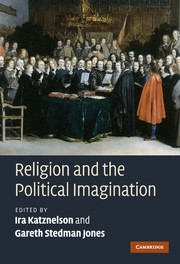Book contents
- Frontmatter
- Contents
- List of contributors
- Acknowledgements
- Introduction: multiple secularities
- 1 Secularisation: religion and the roots of innovation in the political sphere
- 2 Regarding toleration and liberalism: considerations from the Anglo-Jewish experience
- 3 The Enlightenment, the late eighteenth-century revolutions and their aftermath: the ‘secularising’ implications of Protestantism?
- 4 In the lands of the Ottomans: religion and politics
- 5 The Russian Orthodox Church and secularisation
- 6 The American experience of secularisation
- 7 French Catholic political thought from the deconfessionalisation of the state to the recognition of religious freedom
- 8 Religion and the origins of socialism
- 9 From 1848 to Christian Democracy
- 10 The disciplining of the religious conscience in nineteenth-century British politics
- 11 Colonial secularism and Islamism in North India: a relationship of creativity
- 12 The 1960s
- 13 Gendering secularisation: locating women in the transformation of British Christianity in the 1960s
- 14 Does constitutionalisation lead to secularisation?
- 15 Europe's uneasy marriage of secularism and Christianity since 1945 and the challenge of contemporary religious pluralism
- 16 On thick and thin religion: some critical reflections on secularisation theory
- Index
10 - The disciplining of the religious conscience in nineteenth-century British politics
Published online by Cambridge University Press: 05 June 2012
- Frontmatter
- Contents
- List of contributors
- Acknowledgements
- Introduction: multiple secularities
- 1 Secularisation: religion and the roots of innovation in the political sphere
- 2 Regarding toleration and liberalism: considerations from the Anglo-Jewish experience
- 3 The Enlightenment, the late eighteenth-century revolutions and their aftermath: the ‘secularising’ implications of Protestantism?
- 4 In the lands of the Ottomans: religion and politics
- 5 The Russian Orthodox Church and secularisation
- 6 The American experience of secularisation
- 7 French Catholic political thought from the deconfessionalisation of the state to the recognition of religious freedom
- 8 Religion and the origins of socialism
- 9 From 1848 to Christian Democracy
- 10 The disciplining of the religious conscience in nineteenth-century British politics
- 11 Colonial secularism and Islamism in North India: a relationship of creativity
- 12 The 1960s
- 13 Gendering secularisation: locating women in the transformation of British Christianity in the 1960s
- 14 Does constitutionalisation lead to secularisation?
- 15 Europe's uneasy marriage of secularism and Christianity since 1945 and the challenge of contemporary religious pluralism
- 16 On thick and thin religion: some critical reflections on secularisation theory
- Index
Summary
The most important variable in the relationship between religion and politics in modern British history has not been the strength of religion but the strength of politics. The key question is not the extent of ‘secularisation’ at any one time – which is fortunate, given how tricky and unstable a concept it is. Religion has not played as destabilising a role in British mainland politics over the last two centuries as it has in some other countries. But it does not follow that religion has been a marginal influence in a ‘secular’ political culture. This chapter argues that, on the contrary, religion has often been a major theme in politics, certainly in the nineteenth century. However, religious disagreements were confined and muted by political processes. In Britain, the religious conscience was disciplined to accept the legitimacy and primacy of political institutions, even while it remained vibrant within the broader public culture.
Most prominent in asserting a religious conscience were evangelical Protestant Dissenters, for whom opposition to state support for religion was a basic principle. As soon as the political reforms of 1828–32 gave them a national political presence, they started agitating against the requirement to pay rates for the upkeep of the local Anglican Church, their exclusion from Oxford and Cambridge universities, and the existence of the Anglican Church establishment itself in England, Wales and Ireland.
- Type
- Chapter
- Information
- Religion and the Political Imagination , pp. 214 - 234Publisher: Cambridge University PressPrint publication year: 2010
- 1
- Cited by

